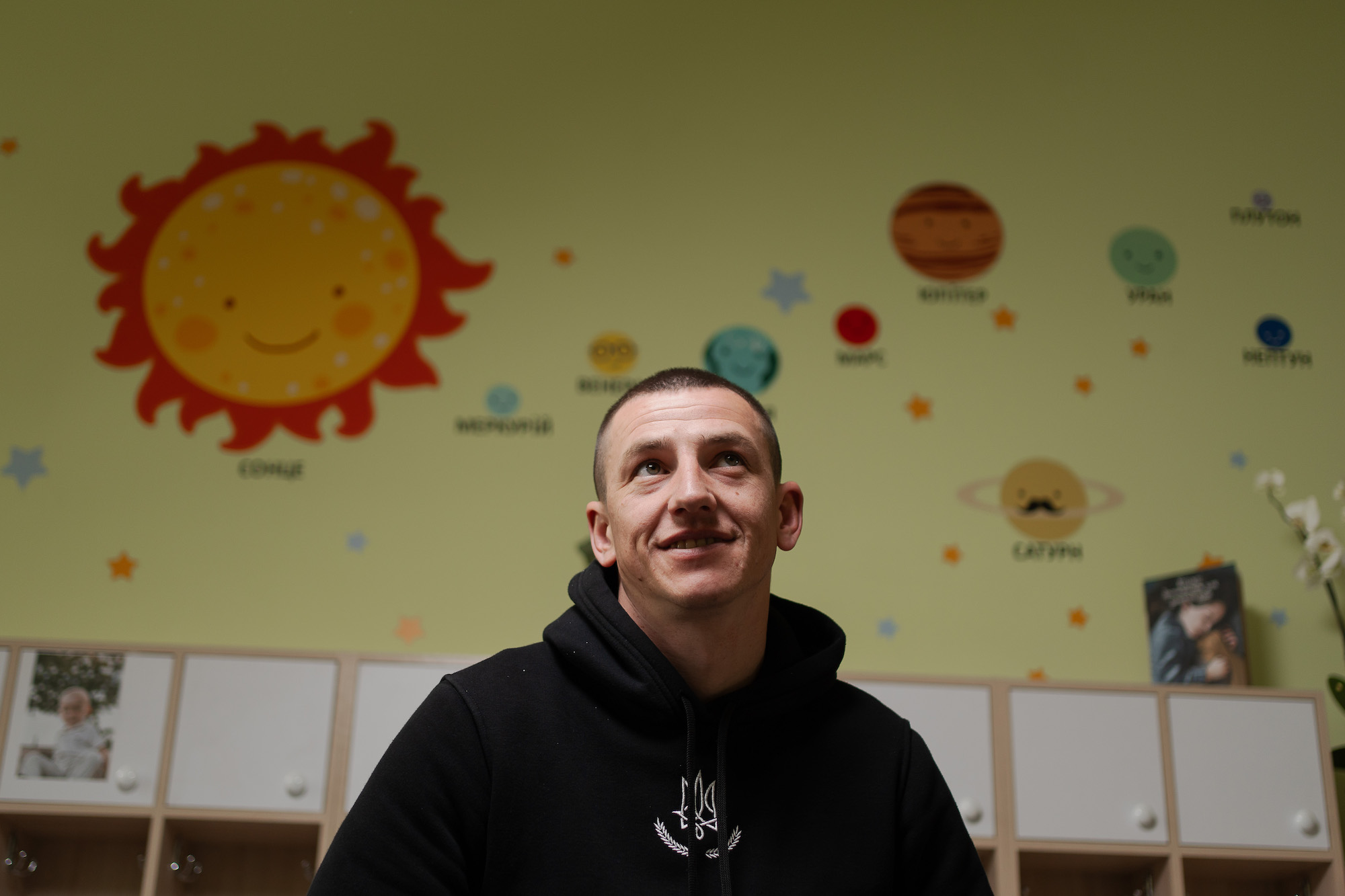
Great teacher Onizuka
Andrii Odarenko, 30, who lost his leg in the war, founded an IT-school for children where he not only teaches them coding, but also helps his students find their own way and build an ideal country.
Fellowship
Andrii gets into his brown Hyundai. Confidently and decisively, he presses the gas. It’s not obvious that he does it with his iron leg. While we drive along wide and sunlit Khmelnytskyi streets, he keeps answering phone calls and messages. Today is the Day of Heroes, so Andrii receives tons of congratulations. Tall green trees and wide city alleys outside the car window are slowly giving way to a different landscape: gray high-rise buildings. Behind them, elegant small cottages reveal the hidden historical landscapes of Khmelnytskyi.
In the morning, before meeting with us, Andrii attended official events in the city, where he was congratulated, awarded a certificate, and thanked for his defense of Ukraine. He does not fancy excessive formalities, but says it is important to participate in such events, primarily to remind others of those who have returned from the war.
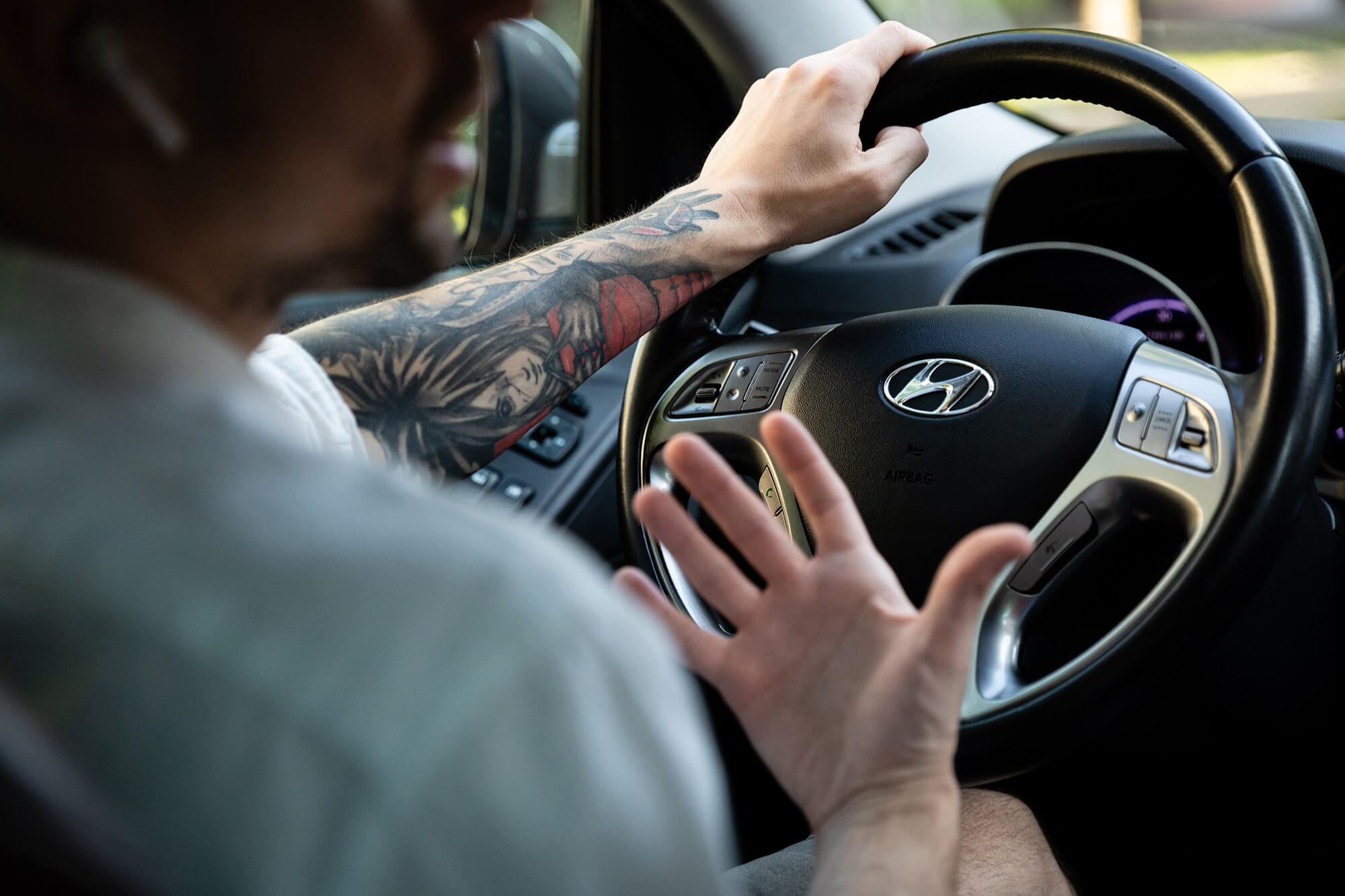
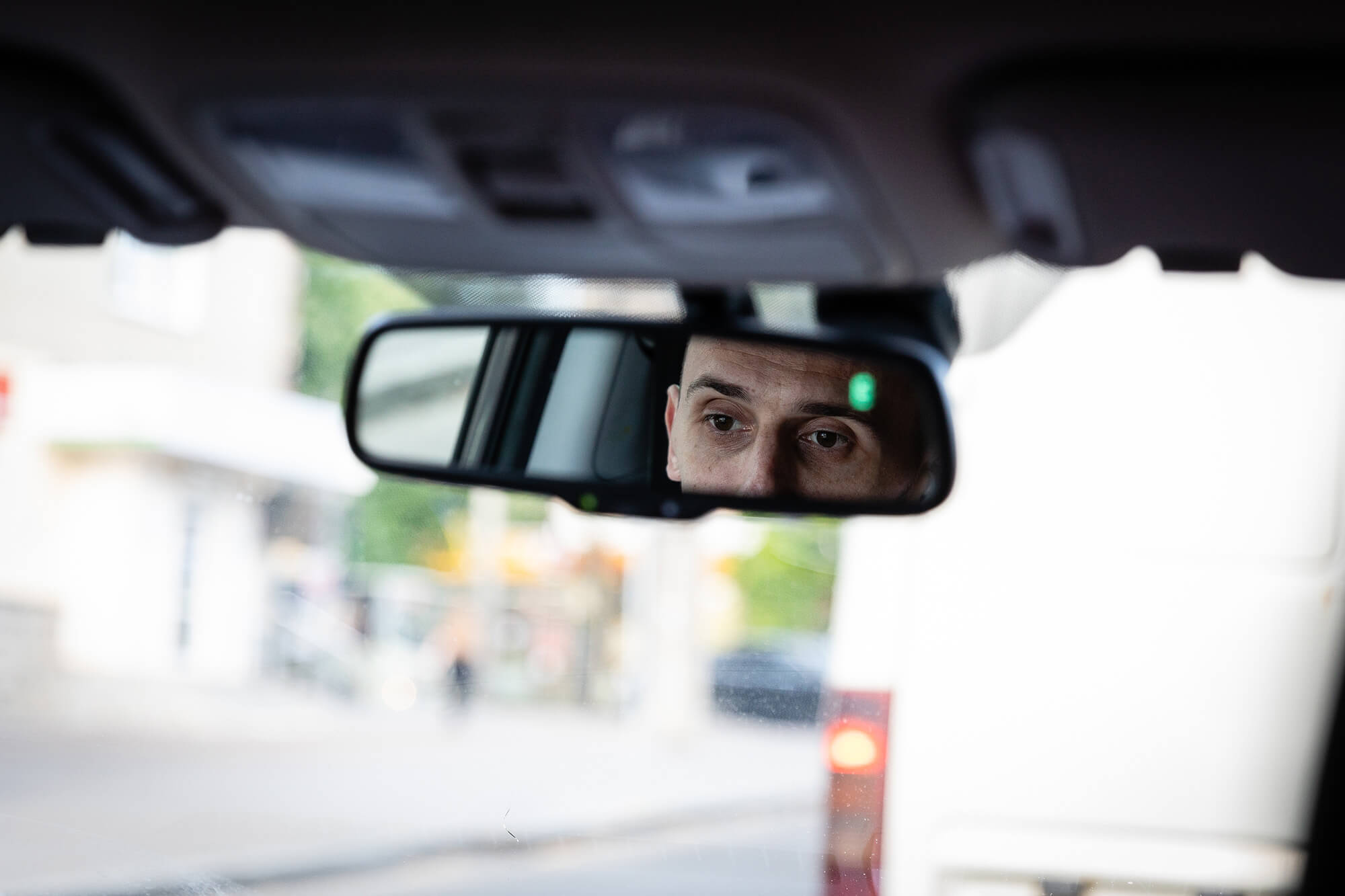
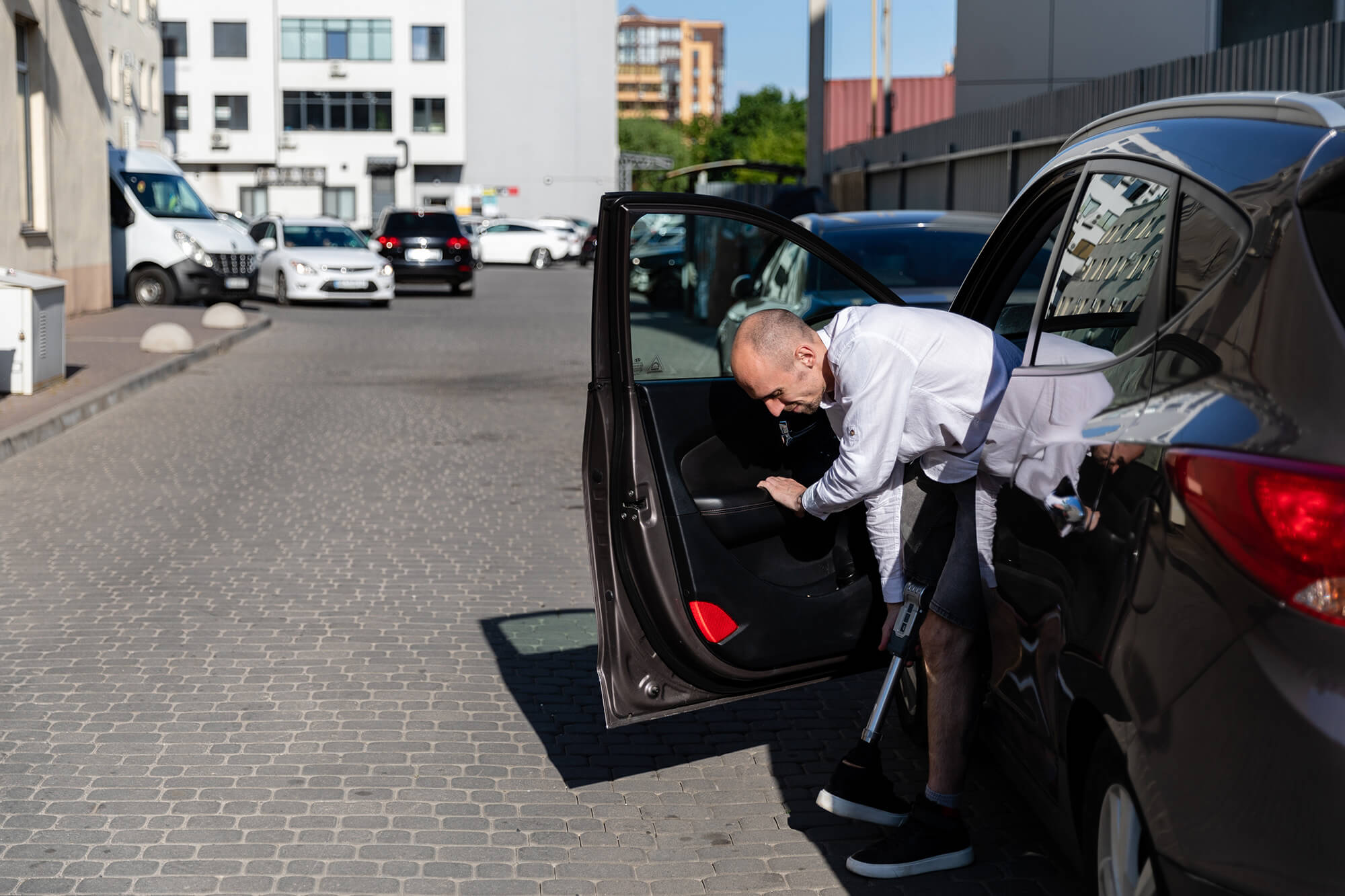
“Here is Pasha. He pulled me out when I was lying wounded in a trench,” says Andrii, when his mobile phone rings for the hundredth time. During conversation with his brother-in-arms Pasha, he settles various matters and agrees on further joint projects and initiatives concerning female and male veterans.
Way
Andrii Odarenko is a thirty-year-old former policeman. In a white linen shirt, with an ascetic haircut (shaved bald), a thin figure, and a focused look, he looks more like a Buddhist monk or a saint from Byzantine images. However, Andrii’s hands-on experience as a police officer comes through in the way he speaks; he is precise and chronological in his storytelling, meticulous with details, concise and expressive.
Andrii worked as a police officer for seven years. At first, he worked as a district inspector, then moved to the patrol police and studied at a specialized academy. Andrii with his grandfather and uncle having held high positions in law enforcement, Andrii could have easily and swiftly built a great career. However, Andrii decided to take his own path. He always looked for justice and personal responsibility for his country.
In 2015, he went to the east as a volunteer. He fought in Siversk and near Popasna. Andrii hardly speaks about his frontline service. Or generally about the great war. He only states that the Anti-Terrorist Operation, (ATO) [the phase in Russo-Ukrainian War that took place in Donetsk and Luhansk Oblasts in 2014-2022 — Ed.] and the full-scale Russian invasion differs like heaven and earth.
On his return from ATO, Andrii finally decided to quit his occupation and went abroad.
One visit to the training ground and 21 fired rounds
In Bulgaria, he worked in a restaurant kitchen. In the Czech Republic, he assembled BMW seats at a factory. Then he received an agricultural degree and went to Denmark, where he signed a contract with a dairy farm. He became one of the best employees there. The owner entrusted Andrii with the most important matters of the company. On February 24, 2022, Andrii still went to work in the morning, extremely worried about his family and city. About his land. His friends and colleagues, who stayed in Ukraine, persuaded him not to go; they said the enemy wouldn’t reach Khmelnytskyi, and everything was going to be okay.
“But I’m reading the news, thinking: ‘That’s okay? They are near Kyiv already.’”
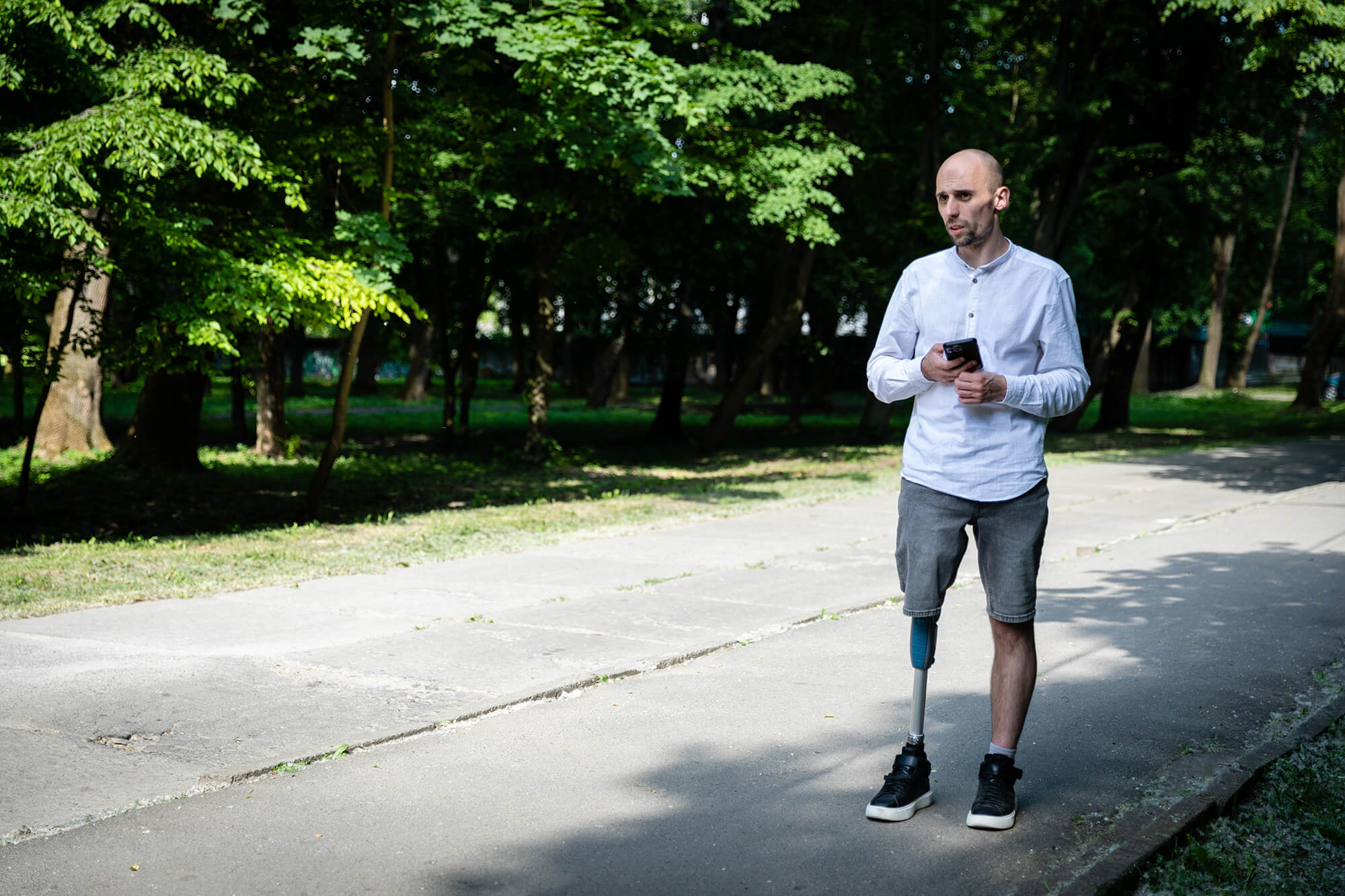
He packed his bag in ten minutes. On Facebook, he quickly found a car that took him home. On February 26, he was in Ukraine, and starting from March he joined Khmelnytskyi TD (territorial defense), as it was almost impossible to join the Armed Forces of Ukraine at the beginning of the full-scale Russian invasion.
For the first ten days, Andrii patrolled the city. One visit to the training ground and 21 fired rounds. Then came the frontline and living on the verge of dying. He crossed the whole Kharkiv direction.
Sit together for one last time
At 5 a.m. on May 9, 2022, Andrii was lying in a trench at a combat position in the forest near the village of Bohorodychne in Donetsk Oblast. Suddenly, he heard a loud explosion. A severe blow immediately tore his leg off. With the remnants of his strength, he crawled to his brothers-in-arms 20 meters away. Two soldiers carried the wounded Andrii on their backs for a few kilometers. One of them was the aforementioned Pasha, with whom Andrii now works to help Ukrainian veterans. The other fellow soldier died two hours later.
Andrii waited at the evacuation site for more than two hours. He prepared himself to die, thinking that no one would come to rescue a single soldier there, in the dangerous zone constantly shelled by enemy artillery. But life didn’t let Andrii go. Finally, he was taken off the battleground and moved to the closest military hospital in Donetsk Oblast. A quick leg amputation was necessary to prevent kidney failure. After the amputation, Andrii fell into a coma. Doctors told his beloved Nastia to come and sit next to him for one last time. Andrii’s prospects were entirely unpromising. But life didn’t let him go for the second time. Three days later, Andrii opened his eyes.
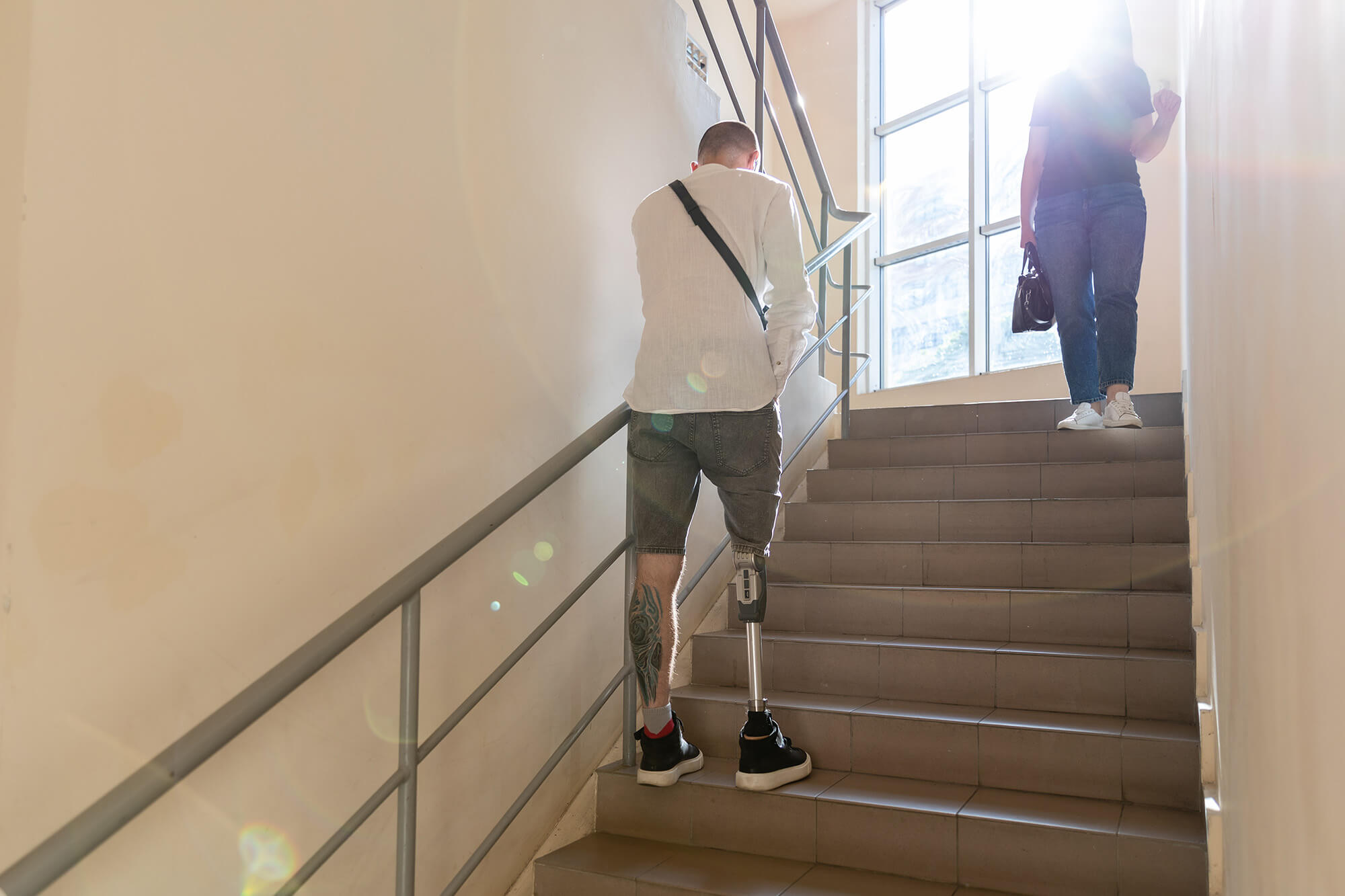
He spent almost a year in several hospitals throughout the country. The veteran from Khmelnytskyi had to learn how to walk from scratch, which demanded extensive physical and psychological rehabilitation.
Andrii had above-knee amputation, thus his adaptation requires significant efforts—psychological efforts, first of all. While we speak at the city park, an empty alley fills with people. Dozens of passers-by walk by. Each of them takes a glance at Andrii’s prosthesis. Some do it rather ostentatiously. Others quickly avert their gaze.
Life from scratch
“Children are tabula rasa, blank slates. That’s why it’s so easy for me to deal with them.”
Slowly but confidently, Andrii walks up the stairs to the first floor of a modern high-rise building to present the space of his IT-school for children, School of Modern Skills. A few months ago, he founded this school as a veteran business.
He has a long-standing love for children. At the frontline, the hardest thing for him was to see Russian rockets killing children, ruining their homes and families, and stealing their childhood and joy of life
Therefore, on his return from the front, he decided to do something important and useful specifically for children. This way, he can invest in his country’s future, as children and veterans are his main focus at the moment.
The idea of creating an IT school in his native Khmelnytskyi did not appear at once. At first, Andrii intended to get a job at the local territorial center for recruitment and social support, until one day he ran into an old friend with whom he had gone to kickboxing classes in his youth. The friend suggested contacting another mutual friend, a potential trustworthy partner, who offered to lead the New Horizon project to help veterans and the idea of creating an IT school. Andrii was immediately inspired with this idea. He created a project and submitted it for two state grants for the veterans. He received positive response from both, and with the first 750 000 hryvnias he founded his own startup for children, School of Modern Skills.
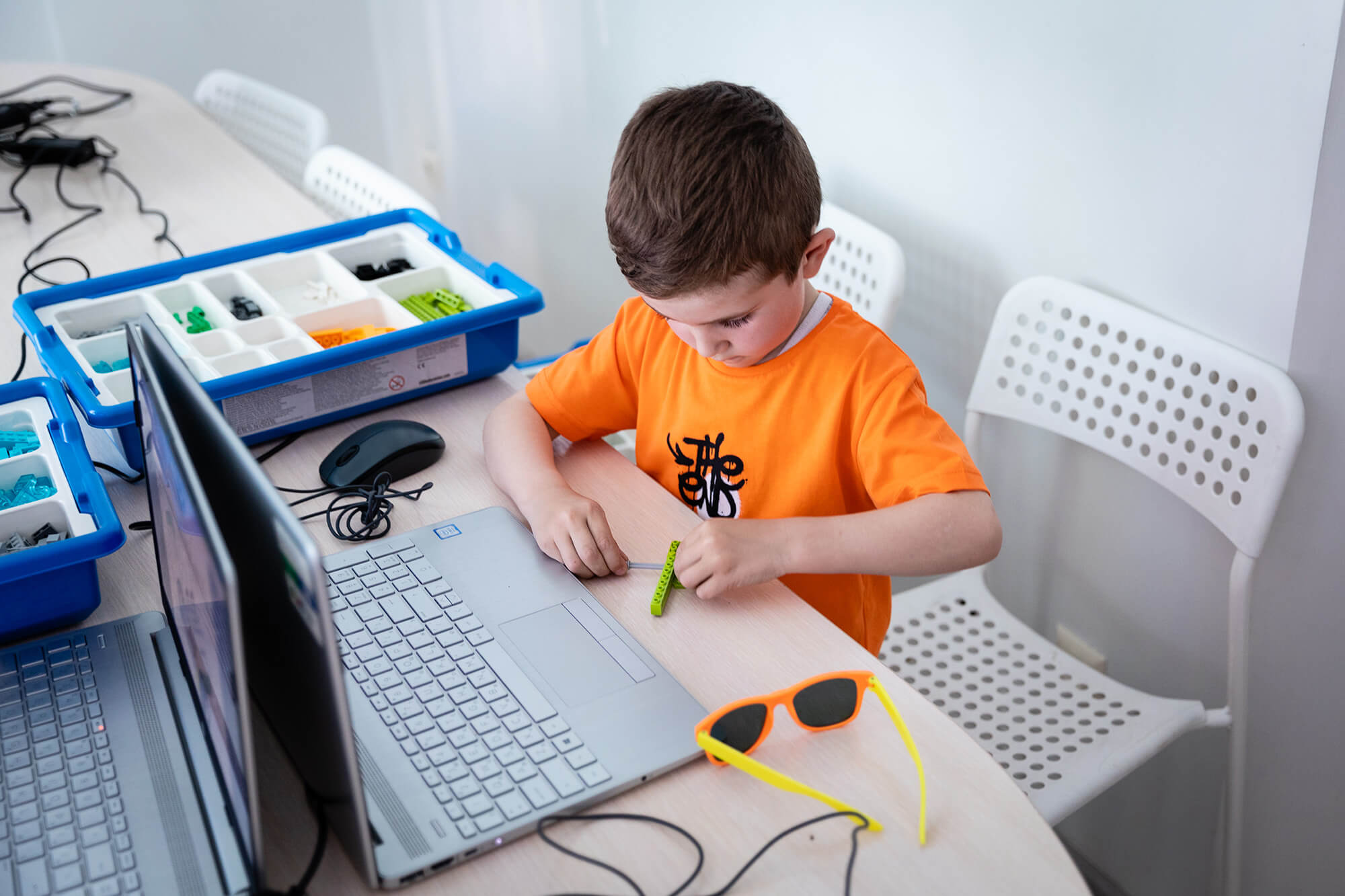
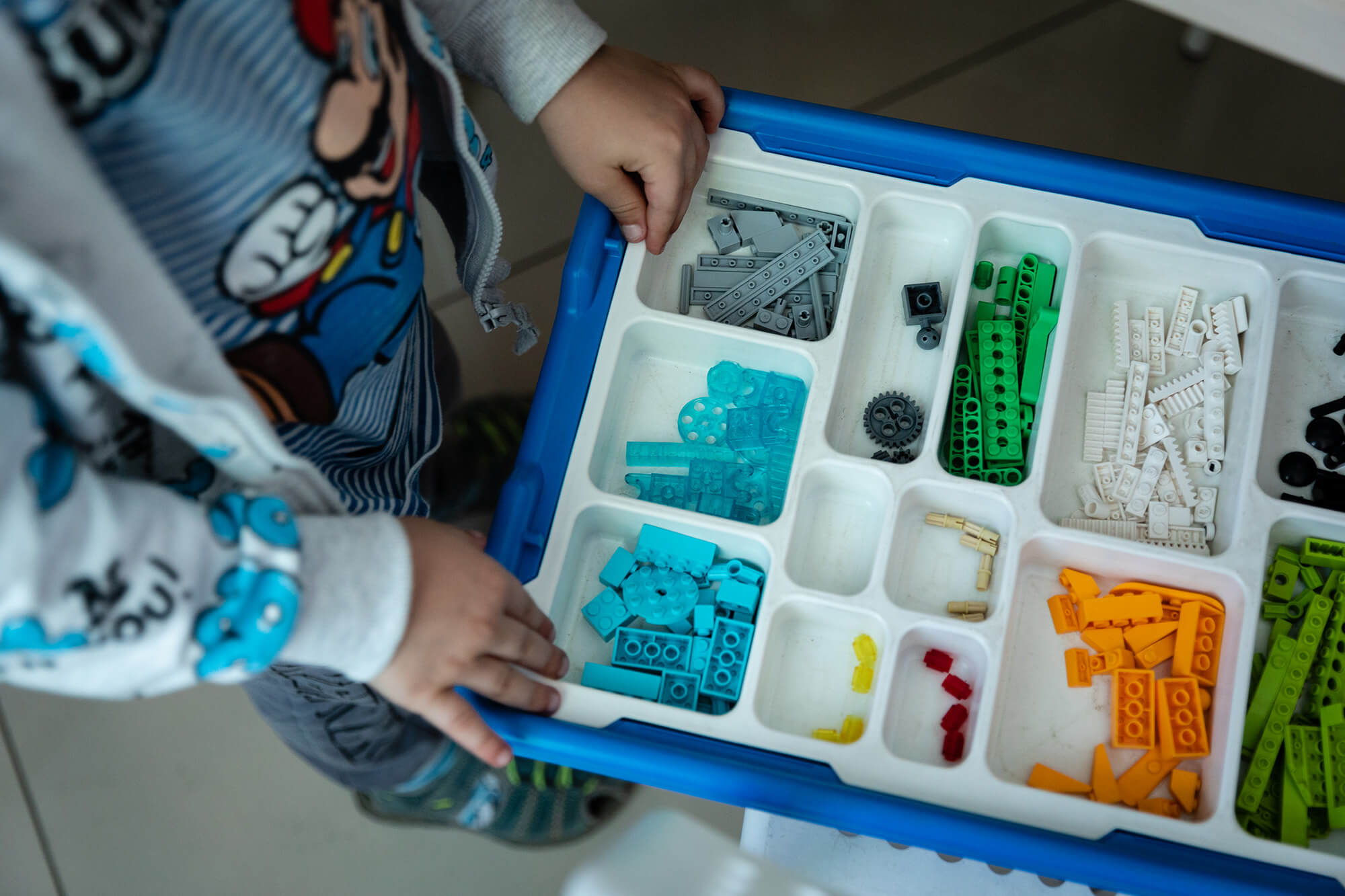
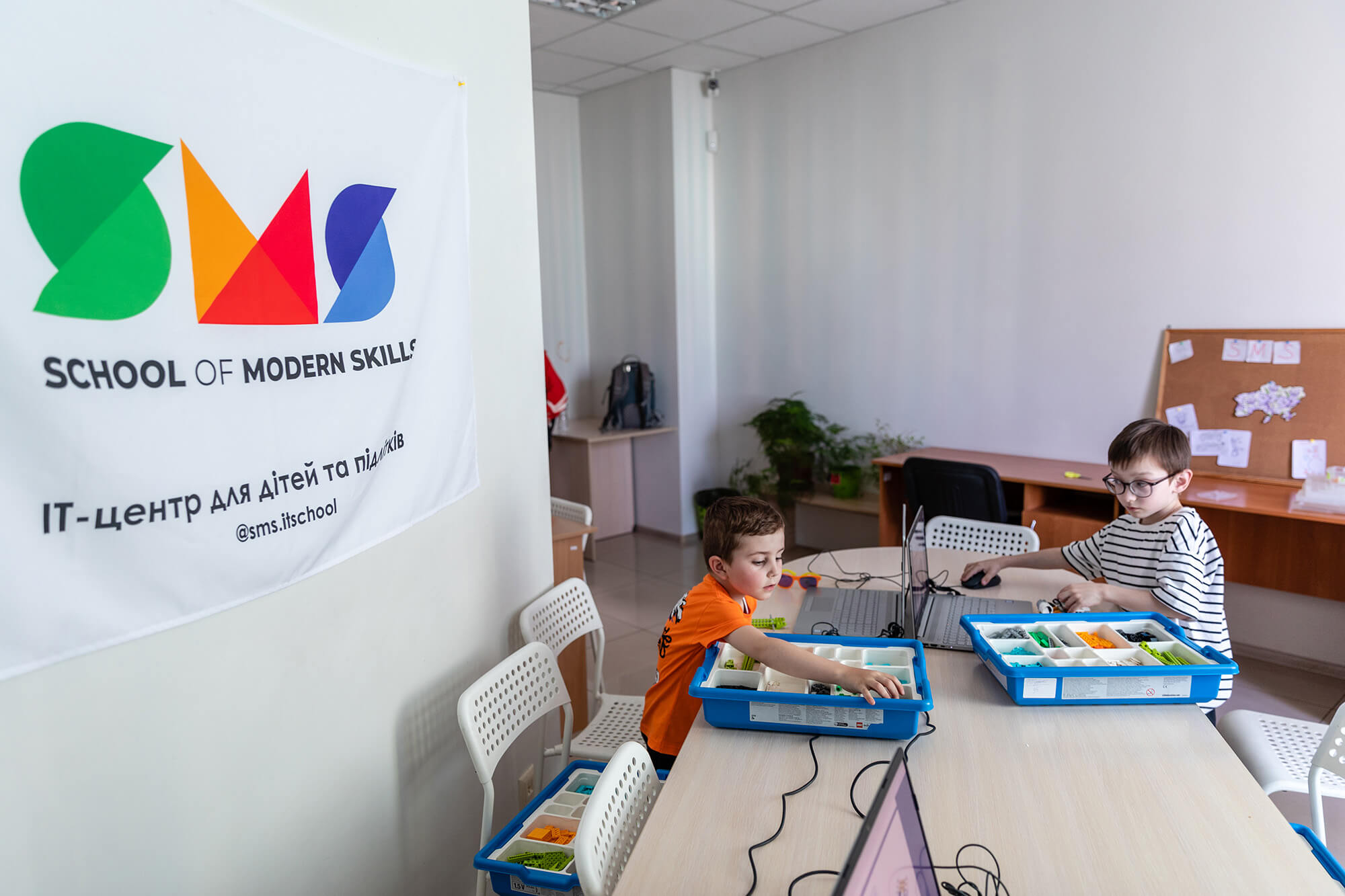
The school offers a range of programs: Lego and Arduino robotics, programming in the Minecraft game, IT-Start, basics of programming, Illustrator & Photoshop. There are also more advanced topics: Python programming and web design in Figma. While Andrii shows us around the school, there is a class going on in one of the classrooms. The youngest students put together their favorite Lego creations in a relaxed, playful way. A young teacher approaches every child one by one, praising them for the details of the task they have worked hard on with the help of their construction sets. Instantly, one of the small students cheerfully claps his hands, happy to succeed in the task.
“A Teacher is someone a child can approach with any trouble they experience. Without fear. Without shame. It’s something I lacked at school. We were scared pupils. And I always wanted to have a teacher-mentor. So, I want it to be different at our school. Have you seen the anime “Great Teacher Onizuka”? – suddenly asks Andrii, and, before I can answer, continues. “So, let’s have teachers like Onizuka.”
“Great Teacher Onizuka” is a 43-episode Japanese anime series directed by Abe Noriyuki. It’s a story about a former member of the Onibaku street gang, biker Onizuka, who comes to Tokyo in search of a better life and gets a job as a teacher at school. Students declare a boycott on the new teacher, but Onizuka’s sincerity and simplicity allow him to win the respect of children and parents. He fascinates with his sincere enthusiasm and perseverance.
Andrii’s love of Japanese anime is hinted at by his two tattoos. One, located on his left arm, depicts manga characters (manga is text illustrations, a kind of comic that have become a special kind of art in Japan; this trend began to develop after World War II), they immediately caught my attention.
Midday sun sneaks through white blinds, intertwining light and shadow in the cool room we speak in. In the school hallway, ammunition casings lie in a tidy row on the shelves. Above them, on the cubbies, there stand trophies brought from the battlefield by the soldiers and painted by children. Now they can be purchased for a symbolic price. In this way, the veteran supports those who continue their fight on the frontline.
Veterans and children
Andrii Odarenko manages all the processes of his IT School of Modern Skills. He deals with organizational, administrative, and financial tasks. He selects the staff, forms a teaching team, and constantly improves his own skills and knowledge. This is just one of the many activities to which the Ukrainian veteran dedicates his efforts.
Andrii regularly attends meetings at local schools to motivate the youth to change the society, to become conscious and responsible Ukrainians, love their country, culture, and history, and to feel their own identity. Additionally, Andrii is one of the founders of New Horizons community, which supports the veterans of Khmelnytskyi Oblast. He arranges public events to support the Armed Forces of Ukraine, meets with local officials to improve cooperation between the veterans’ sector and the authorities, and goes to Brussels to meet NATO representatives to tell them about the urgent needs of his brothers-in-arms. He also visits soldiers at hospitals, encouraging them and keeping their spirits up.
He believes that this country has great potential. And that we are the main factor.
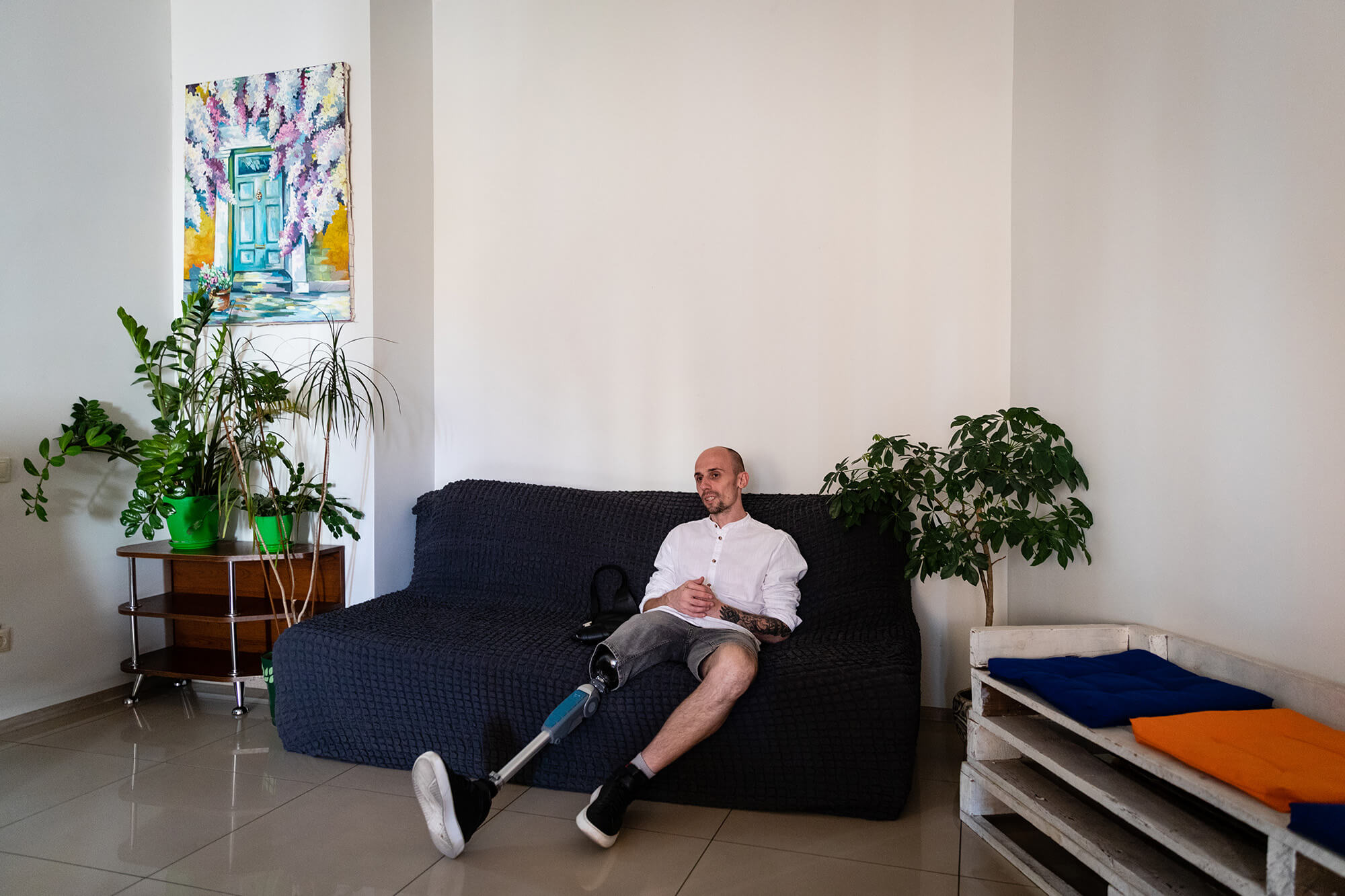
“If I had to choose again, who would fight—an 18-year-old or myself—I would choose myself, of course.” Andrii smiles calmly and confidently. “They are children. They need to build our country.”
As the city is slowly filled with blue dusk, the last rays of the tired sun contour the roofs. The darkened sky hangs above the city’s balconies and white balustrades. Crimson shadows of the evening fill the streets.
Andrii jokes a lot: about life, where he learns to love from scratch, about friends. about himself, and, about one of his tattoos on his right leg that he had always wanted to remove. But the war brought its own corrections.
“Now, instead of the skull, I have a prosthesis there,” he laughs. “As we are people with unlimited capabilities! And I will do all I can for this country to become better.”
“The Power to Continue” is a collaborative project between the United Nations Development Programme in Ukraine and Reporters. Our goal is to share unique stories of veterans and civilians who have lost limbs in Russia’s war against Ukraine, and not only found the strength to survive the trauma but also became drivers behind social projects and bold business ideas. We also highlight the stories of people who have helped them along the way. While there are not many of them, these people inspire and speak openly about their experiences, and this might become a starting point for others.
The special project was initiated by Reporters with the assistance of UNDP in Ukraine and financial support from the European Union as part of the “EU4Recovery—Empowering Communities in Ukraine” project. The opinions, recommendations, assessments, and conclusions expressed in these materials do not necessarily reflect the official position of UNDP, the EU, or their partners.
Have read to the end! What's next?
Next is a small request.
Building media in Ukraine is not an easy task. It requires special experience, knowledge and special resources. Literary reportage is also one of the most expensive genres of journalism. That's why we need your support.
We have no investors or "friendly politicians" - we’ve always been independent. The only dependence we would like to have is dependence on educated and caring readers. We invite you to support us on Patreon, so we could create more valuable things with your help.
Reports130
More


